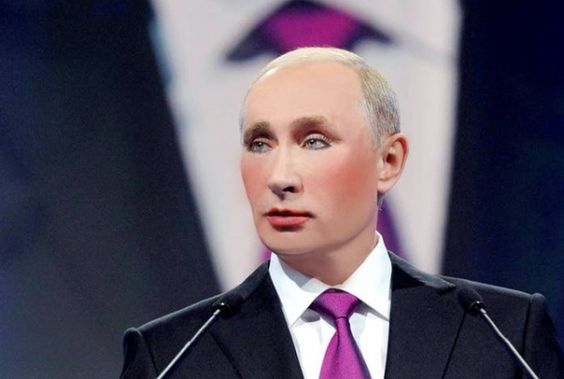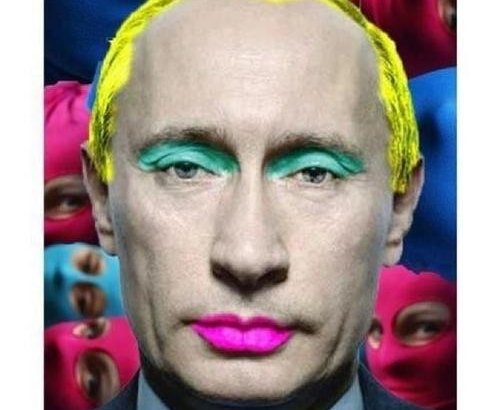The Bold Reason People Are Risking Jail to Share These Images of Vladimir Putin
By:
Russia's Ministry of Justice has officially banned an anti-Vladimir Putin meme that depicts the Russian leader in heavy clown makeup and can be interpreted as insinuating that he's gay.
In response, such pictures are being shared all over the internet, showing solidarity with the Russian LGBT community that's becoming an increasing target for harassment and violence.
The Moscow Times first reported that the picture, featuring Putin sporting "red lips and painted eyelashes," became no. 4,071 on the Justice Ministry's list of "banned extremist materials." The punishment for posting or sharing such an image is "15 days in prison or a fine of 3,000 rubles ($53)," a harsh rebuke for a country where median monthly wages are 32,000 rubles, according to CNN.
The Justice Ministry hasn't released the photo at the center of the controversy, but the Moscow Times speculated that the image is a variation on this popular meme, seen at protests for several years:
But since these memes are extremely popular among anti-Putin activists, it also inspired other iterations of the image:
 Pinterest - pinterest.com
Pinterest - pinterest.com
 Change.org - change.org
Change.org - change.org
In 2013, Russia passed a controversial law banning "propaganda of non-traditional sexual relations" and discussion of such matters in front of children.
Afterwards, memes of Putin wearing heavy makeup and featuring images traditionally used by the gay community became popular at protests and online.
It appears that the ban on this particular picture stems from a verdict by a regional court, convicting a man named Alexander Tsvetkov of uploading about a dozen racist, pro-Nazi, or inflamatory images to Russia's equivalent of Facebook, VK. While many of the other pictures were already banned as extremist materials, the Putin picture wasn't, so the Justice Ministry quickly rectified this form of expression.
While Tsvetkov was released from criminal liability, he was sentenced to involuntary psychiatric commitment, and it's not clear from news reports if he's still there. He also had his VK account deleted.
In the meantime, the Russian attempt to suppress the photo appears to be turning into an instance of the "Streisand effect," where banning an image causes it gain much more exposure than it would have otherwise. This is especially true on social media, which Russian authorities have been harshly policing under the guise of combating "internet extremism."
The ban on satirical Putin photos is the latest salvo by Russian authorities against internet expression, including the state cracking down on inflammatory memes in 2015, giving prison terms simply for clicking "like" on anti-state content, and a newly-proposed law forbidding anonymous social media accounts.
All the while, Russian activists and allies continue to risk jail time by sharing the banned photos.
